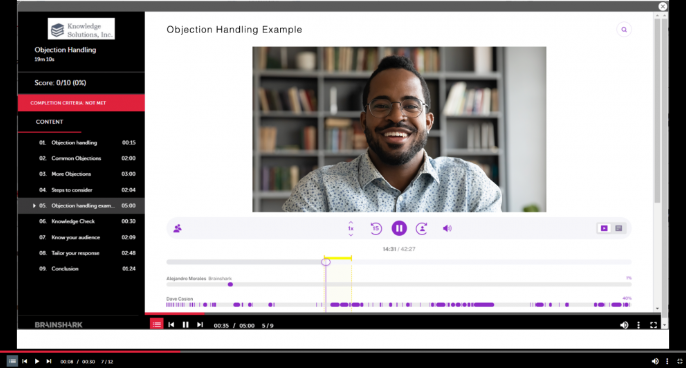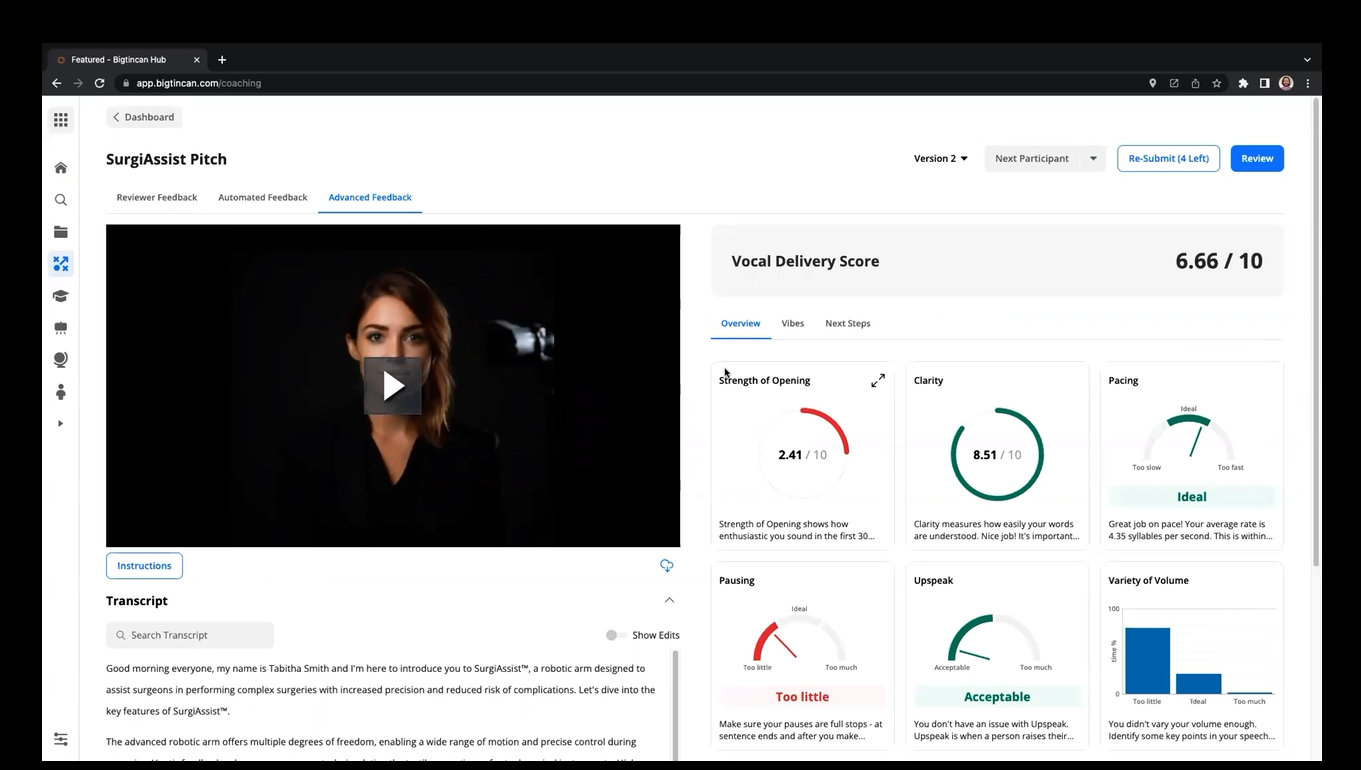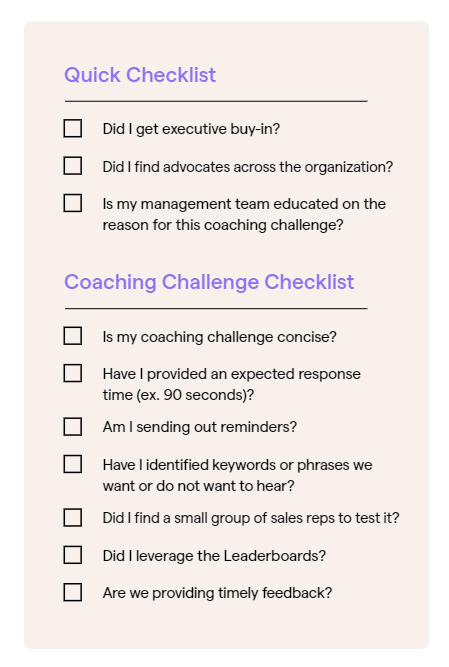6 Sales Role Play Exercises to Try with Your Reps

Sales role play exercises are one of the tried-and-true approaches that sales teams use to help reps practice and prepare for real-world buyer interactions.
Now that many sales organizations are permanently adopting hybrid and remote work, there’s been a shift from in-person to virtual coaching sessions. So it’s mission-critical that you can validate your reps’ ability to move deals from lead to close no matter where they’re working.
Sales readiness platforms with video coaching capabilities, as well as video conferencing and collaboration tools, can ensure there’s no interruption to facilitating effective role plays. These platforms also help to recreate the in-person ‘water cooler’ talk that reps often depend on for tips and tricks on how to handle selling situations.
Below are six sales role play exercises on key topics to try with your reps that can be conducted no matter where they’re working today.
6 key role play exercises to try with your sales reps
- Objection handling
- Negotiation
- Discovery
- Competition
- Buyer personas
- Getting to power
#1. Objection handling
Objections are one of the toughest responses for reps to react to — that is, if they’re not adequately prepared.
You can design sales role play exercises that cover many of the common objections that the sales team receives (and has trouble handling) or tailor the exercise to a recent scenario that a rep dealt with.

There are some fairly standard objections like pricing, but you will want to get feedback from your reps on which objections they hear most often from your customers, as these will vary from company to company.
A video coaching tool like the one pictured here makes it easy to scale role play exercises to multiple reps or even your whole sales team.
Example: Ask them to respond to a common buyer objection, such as, “I need more time to decide so I’ll be putting this decision on the back burner for another 6 months.”
Sales managers should respond to the role play by:
- Looking for a rep’s ability to transition from the objection and discover why the prospect is choosing the status quo.
- Providing a score and specific feedback, just as they would during an in-person role play exercise.
- Having the rep run their role play through a Coaching AI tool for more, objective feedback in addition to the manager or coaches’ comments for thorough coverage.
By issuing the question to multiple reps via video coaching, sales and/or enablement managers can also capture the best responses and send them out to the team afterwards as an evergreen, on-demand learning opportunity.
#2. Negotiation
Negotiations are challenging for most reps but if they’re not prepared to find a middle ground with the buyer, deals can easily stall.
Example: To practice these scenarios, create a role play simulating a buyer asking for a product discount based on a lower price they’ve received from a competitor. This can either be done live via video conference (and you can ask reps to raise their hands to respond) or through a video coaching activity.
Managers should look for reps to show that they understand how to use a “give and get” negotiation strategy, such as getting the buyer to commit to a longer subscription in exchange for lower price.
#3. Discovery
The discovery process will be successful if reps know how to ask good questions and confirm information they’re hearing. And since discovery is so crucial to moving deals forward, you’ll want to validate those skills within each individual rep.
Creating different role plays for each rep can help hone their individual discovery skills. Video coaching activities are a simple way to organize this because you can ask each rep to show how they’d respond to buyer personas with different trigger points.
Example questions:
- What are the top three discovery questions you would ask to identify the problem?
- What are some requirements based on the buyer’s company, industry or current situation?
Managers should look for reps to demonstrate that they can answer questions by summarizing the business challenge using your company’s sales methodology.
You can also design group role plays via video coaching to help reps navigate common discovery scenarios. Useful examples from this exercise can then be used as onboarding content.
#4. Competition
There are a variety of challenges that can arise when you’re contending with a competitor during the sales process, especially because many industries and markets have new players entering all the time and changing the landscape.
Sales role plays can help ensure reps are up to date when a buyer asks them about competition.
Example: If multiple reps have come up against a competitor that offers a similar product at a lower price but with lesser capabilities, create a group video coaching activity or ask reps to act out the scenario in your next meeting or training session.
The key for managers is to see if reps can highlight the power of your product’s capabilities and how they will help solve the buyer’s business challenges.
The best responses can be added to a training course or curriculum that covers key information about this competitor. Or you can ask reps that performed the best to act out the scenario in your next live or virtual training session.
#5. Buyer personas and ICP
Knowing your buyer personas and ICP (ideal customer profiles) and how to have effective conversations with each of them is an important skill for reps to have.
Example: To test reps’ skills, conduct a role play requiring them to tailor a conversation to a new or challenging persona.
For example, if you aren’t having luck getting in front of marketing leaders, assign a video coaching activity where reps should describe the persona’s top challenges and how your product can solve them.
Managers or enablement teams can also take the role play a step further by asking reps to submit a video of themselves (or recite it live via video conference) delivering a pitch that’s designed specifically for marketing leaders and evaluate how they were able to highlight areas of your product that would help that group reach their goals.

Pictured: Brainshark/Bigtincan Coaching AI pitch feedback
#6. Getting to power
A common hurdle in the sales process can be reps’ ability to “get to power” or speak to a decision maker to accelerate deals.
Example: Sales role plays that can help with this skill can be centered around ways to enable your champion to connect you to the decision-maker.
Assign a video coaching activity asking reps to demonstrate how they’d broach that subject with their champion.
After the coaching activity, managers can hold a team meeting to review the video responses, discuss whether the reps’ approaches were effective in ongoing deals and continue to hone best practice techniques as time goes on.

Get this checklist plus more ready-to-go role-play and coaching prompts in the Sales Coaching toolkit.

